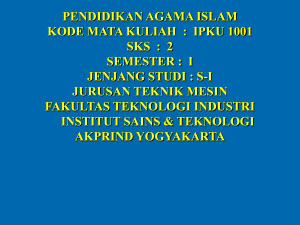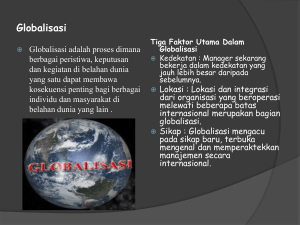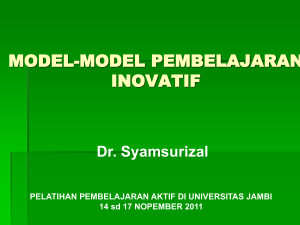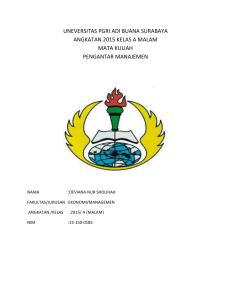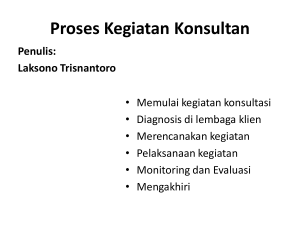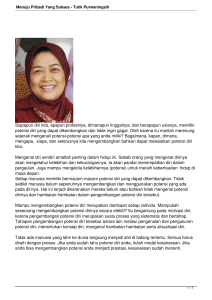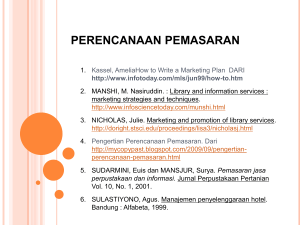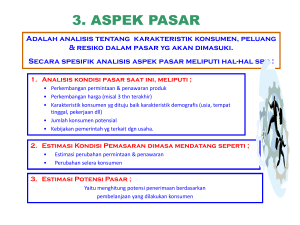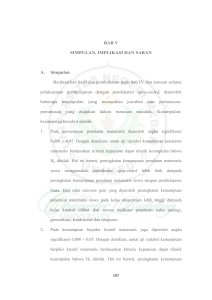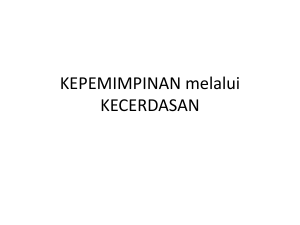Manajemen Proyek: Overview
advertisement
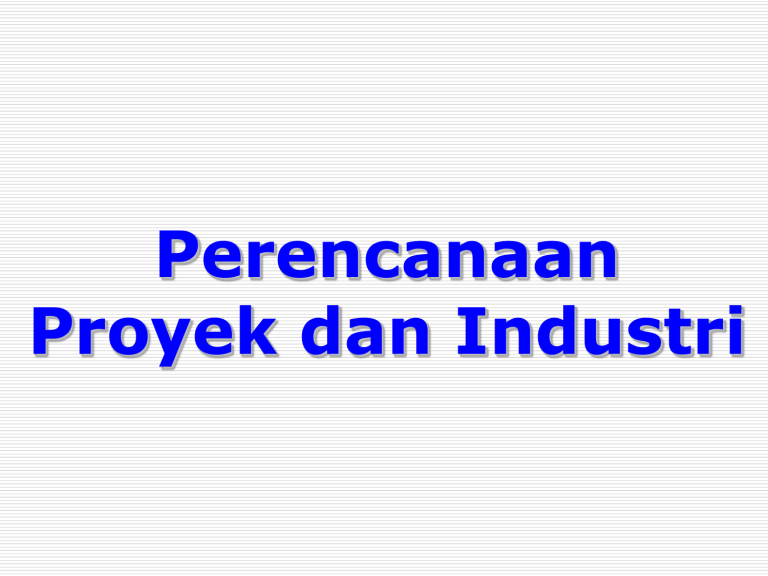
Perencanaan Proyek dan Industri Manajemen Proyek Para executive perusahaan akan menghadapi tantangan berat dimasa mendatang: finansial, bahan baku, inflasi, dll. Kondisi di atas biasa diatasi dengan, misalnya program penghematan biaya pensiun dini, PHK, pengurangan tenaga kerja, dsb. Manajemen proyek menawarkan cara untuk menjawab tantangan dengan pengendalian yang lebih baik terhadap penggunaan sumber daya yang dimiliki. Apa itu manajemen proyek? Proyek: serangkaian pelaksanaan kegiatan yang: Memiliki spesifikasi objektif tertentu yang harus dicapai. Memiliki saat dimulai dan saat selesai tertentu. Memiliki keterbatasan dana. Memerlukan sumberdaya manusia dan material. Bersifat multifungsi dan disiplin. Manajemen Proyek: Mencakup perencanaan (Planning) dan pemantauan (Monitoring) Perencanaan: definisi persyaratanpersyaratan kegiatan yang dilakukan, jumlah dan kualitas pekerjaan, sumber daya yang diperlukan oleh setiap pekerjaan. Pemantauan: Memantau kemajuan kegiatan, membandingkan hasil dan rencana, menganalisis impak, membuat penyesuaian-penyesuaian. Manajemen Proyek: A facilitation of the planning, scheduling, and controlling of all activities that must be done to meet project objectives PEOPLE TOOLS Good Project Management SYSTEMS Manajemen Proyek: The people who must do the work should develop the plan. The nature of a project changes at each phase in its life cycle. Empat Kendala Proyek P = Performance requirements: technical and functional. C = Labor cost due to the job. T = Time required for the project. S = Scope or magnitude of work. Hubungan keempatnya adalah: C = f(P, T, S) If you improve quality (performance), you reduce total project costs. Perencanaan Tanggungjawab terpenting seorang manajer proyek adalah perencanaan, pengintegrasian, dan pengeksekusian rencana. Perencanaan: pemilihan objektif dan penetapan kebijakan, prosedur, dan program yang diperlukan untuk mencapai objektif tersebut. Perencanaan: penetapan tindakan-tindakan yang harus dilakukan sesuai dengan kondisi lingkungan yang telah diperkirakan. Siklus Sebuah Proyek KONSEPSI: Input marketing Survey saingan PERENCANAAN: Kembangkan rencana strategi implementasi DEFINISI: EKSEKUSI: Manajemen Definisikan Eksekusi resiko masalah semua pekerjaan Kembangkan visi dan misi Monitoring Koreksi TERMINASI: Laporan akhir Lessonslearned Review Usaha yang dilakukan dalam proses perencanaan Sukses sebuah Proyek The only truly successful project is the one that delivers what it is supposed to, gets results, and meets stakeholder expectations. Sistem Manajemen Proyek Bandingkan progress dengan rencana, koreksi, audit Pengendalian Historis, Definisi current: (biaya, proyek, kemajuan, strategi, kualitas) jadwal kerja Perencanaan Informasi Nilai, sikap, CAD, kepercayaan, Kewenangan, modeling, tanggungjawab, perilaku, Scheduling accountability tradisi Metode Budaya Organisasi Motivasi, kepemimpinan, negosiasi, pembentukan tim, komunikasi, pengambilan keputusan Manusia Metodologi Manajemen Proyek Tahap Definisi: Konsepsi. Kembangkan problem statement, visi, dan misi. Tahap Strategi Perencanaan: Kembangkan alternatif strategi proyek. Untuk setiap alternatif: Cek P, C, T, S Lakukan analisis SWOT Metodologi Manajemen Proyek Tahap Implementasi Rencana: Kembangkan rencana implementasi. Lakukan persetujuan rencana. Tahap Eksekusi dan Kendali: Laksanakan rencana. Cek progres dan akseptabilitas proyek. Tahap Terminasi Lakukan review proyek. Lakukan terminasi. Tahap Definisi Proyek Eighty percent of all projects suffer serious problems, with nearly a third of them being bad enough to be canceled. What causes the project to fail? The Problem, Mission, and Vision How to avoid project from failing? Pendekatan terbaik adalah dengan membuat setiap anggota team untuk secara aktif terlibat dalam proses pendefinisian proyek. Pemahaman problem, kembangkan misi yang menyatakan kemana team akan menuju, dan visi yang menyatakan hasil akhir yang akan dicapai. The Problem, What is it? Setiap proyek hendaknya memberikan pemecahan terhadap persoalan hindari keadaan kita seolah-olah memahami persoalan tetapi sebenarnya tidak: symptom and the real problem! The problem is a gap between where you are and where you want to be that is confronted with obstacles that make the closing gap difficult. Types of Problems Open-Ended Problem Problem dengan solusi lebih dari satu; berorientasi ke future Contoh …. Pendekatan: synthesis Closed-Ended Problem Problem yang hanya memiliki satu solusi; berorientasi ke past Contoh …. Pendekatan: analytical. Menentukan Closed-Ended Problems Gunakan metodologi ilmiah: Ask questions Develop a plan of inquiry Formulate hypotheses Gather data to test those hypotheses Draw conclusions from hypotheses testing Test the conclusions. Menentukan Open-Ended Problems Redefinitional procedures: help develop a good definition for an open-ended problem try to understand what the problem really is. The goal orientation technique: to find the well-defined need and obstacles to progress “what I want?”; “what stopping me from getting it?” The successive abstractions technique: to define the problem from lower level to highest level the wild idea. Menentukan Open-Ended Problems Analogy and metaphor procedures: to find creative solutions to problems as smoothly as well oiled machine; reduce friction between members. Wishful thinking: to define problem from conventional to realistic new insights artificially made; something that never be existed. Nonlogical stimuli: to define problem from one object to another; what things can be used for another purpose. Reversal: to define the problem by making the weakness into strength; the sleepy effect can be used as strength when used at nightime. The Mission, What is it? Adalah pernyataan, statement, untuk memberitahu setiap anggota team kemana akan mengarah; apa yang hendak dikerjakan. The mission: the goal or objective that the team must achieve. The Vision, what is it? Adalah pernyataan untuk mendeskripsikan bagaimana hasil akhir dari sebuah proyek Jika hasil akhir sebuah proyek diketahui, kapan waktu proyek berakhir dapat diketahui The vision: what the final result will look like. Tahap Implementasi Rencana Kembangkan Work Breakdown Structure (WBS): What tasks must be done? Who will do each one? How long will each task take? What materials/supplies are required? How much will each task cost? Kembangkan Network Diagram: What can be done first? What can be done next? What can be done in parallel? Repeat until finished. Tahap Implementasi Rencana Lakukan perhitungan jalur kritis: Forward pass to find early times. Backward pass for late times. Is total duration acceptable? Revise and repeat if not. Alokasi sumberdaya untuk CPM Level resources. Total duration still acceptable? Revise and repeat if not. Tahap Implementasi Rencana Konversi Network ke Bar Chart. Kembangkan kurva penggunaan dan perolehan nilai proyek If you are a project manager, you are proactive … not reactive. In any system of humans or machines, the element in the system that has the greatest variability in its behavior will control the system.
